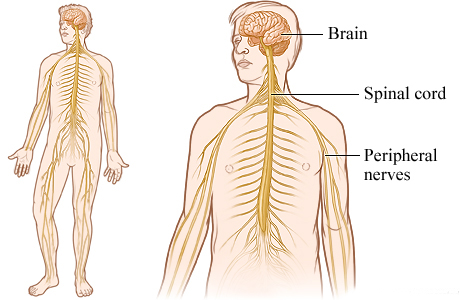What does your nervous system do?
The nervous system includes the brain, the spinal cord, and all the nerves in your body. It controls:
- Sight, hearing, taste, smell, and feeling (sensation).
- Movement, balance, and coordination. It also controls the actions of most other body systems and processes such as digestion and blood flow.
- Your ability to think and reason. It allows you to have thoughts, memories, and language.
The nervous system is divided into the brain and spinal cord (central nervous system) and the nerves that connect the spinal cord to other parts of the body (peripheral nervous system).
What problems can happen with your nervous system?
Nervous system problems may occur slowly. Bit by bit, they can cause you to lose control over something you used to do with ease. Problems also can occur quickly. These problems can be very dangerous. Symptoms may be mild or severe.
Examples of nervous system problems are:
- Injuries. Most often, these are injuries to the head and spinal cord.
- Mental health conditions, such as anxiety disorders or depression.
- Diseases that cause a gradual loss of motor function. These include Parkinson's disease and multiple sclerosis (MS).
- Memory loss. This can be a slight loss of memory that does not affect daily life. Or it could be dementia, which also changes how well you can think and plan. Alzheimer's disease is a type of dementia.
- Infections in the brain and spinal cord, such as encephalitis or meningitis.
- Stroke.
- Seizures.


